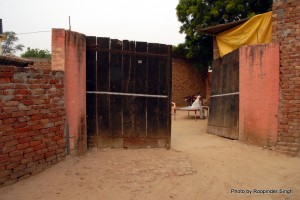Three remote villages in Punjab’s Malwa region have assumed centre stage of the protests triggered by incidents of sacrilege. The tension is palpable, troubling questions elicit few answers. Despite the unease, the villagers remain cautious: No going back to the dreadful days of the 1980s
Burj Jawahar Singh Wala, Bargari and Panjgrain Khurd are Malwa villages used to being on the sidelines, overshadowed by the historic Guru ki Dhab Gurdwara on the Jaito-Kotkapura road. Flustered residents tend to skirt the sudden spotlight, but the scrutiny is relentless, even though it yields little understanding about what exactly is happening in this remote area.
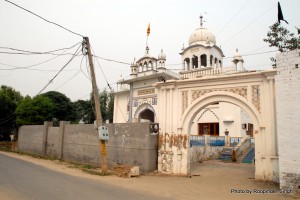
Gurdwara in Burj Jawahar Singh Wala village from where the ‘bir’ of Guru Granth Sahib went missing on June 1,2015.
Political leaders have made a beeline to the villages, and so have religious leaders of various hues. Residents are agitated over the incidents of sacrilege of Guru Granth Sahib. The role of the police, especially its inefficiency and high-handedness, comes in for criticism, but anger, even rage, is reserved for the ruling party and its administrative machinery. Yet, there is a conscious effort to avoid falling into a trap that would evoke the dark decade of the 1980s.
The gurdwara at Burj Jawahar Singh Wala is situated on one of the main roads in the village. It is a small and neat place with the granthi’s quarters built in. It is difficult to imagine how someone could pick up the bir of Guru Granth Sahib, given its bulk and weight, but that is what happened on June 1. An FIR was registered, but the police did precious little to investigate the matter, a delay that was to cost them and the state dear.Four months later, residents of nearby Bargari woke up to the disturbing sight of several pages torn from Guru Granth Sahib scattered around the village gurdwara on October 12. This caused immense consternation. The scattered sheets, reverentially called ang (literally limbs), were gathered and taken away in a tractor-trailer.
Villagers of the area linked the pages to the bir that had gone missing from the Burj Jawahar Singh Wala Gurdwara. There had been no visible police activity in tracking the bir, and thus, public anger focused on the police inaction, which was perceived as indifference.
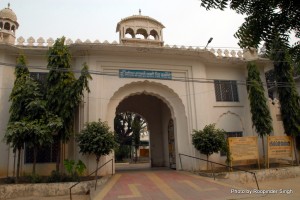
Gurdwara Sahib Patshahi Dasvin in Bargari where the pages of a ‘bir’ of Guru Granth Sahib were found scattered around on October 12, 2015.
The police attempt to disperse the protesters using water cannons and lathis, even arresting some, backfired. Villagers poured into the area, and the local administration backtracked, releasing the protesters. A video of the water cannon and police action went viral, further inflaming the situation. Later, as the crowds got bigger, there was firing by the police. At least one person received bullet wounds.People took to the streets, and the nearby town of Kotkapura became the focus of the protesters, who sat down at an intersection, bringing to halt the traffic movement. Many held lathis, some even swords, but they remained peaceful — langar was served, and speeches made.
Protesters blocked roads on October 14, the heavy police presence notwithstanding. In the police firing at Behbal Kalan, Gurjit Singh of Sarawan village and Krishan Bhagwan Singh of Niamiwala village were killed.
In Sarawan, Pritam Singh Matharoo sits on a charpoy in a well-built house. Gurjit Singh’s grandfather is frail, yet resilient. Even as locals point towards the grieving household, the pall of gloom over the area makes its own statement. The young man was a motor mechanic. It was in the nearby Kotkapura that he learnt the trade, and the family’s pride in his accomplishments is palpable.
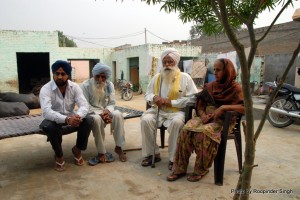
United in grief, the Dada (grandfather), Nana (maternal grandfather), mother and brother of deceased Gurjit Singh who died in police firing on October 14 at Behbal Kalan, during a clash between police and protestors when the latter were blocking National Highway No. 15.
The household has many symbols of material success, a result of the family’s expatriate history. The 27-year-old Gurjit Singh was planning to migrate to Canada, though his father and recently-married brother Jagdeep Singh work in Nairobi, Kenya. This is a family of mechanics, and the young man is remembered fondly by his mother Amarjit Kaur and father Sadhu Singh as being among the first to respond to any call from the local gurdwara for volunteers. He had joined the group of people who were collecting langar and serving it to protesters who had blocked National Highway 15, a short distance from the village.
The family generally supported Gurjit’s acts of social service. There was anger in the entire area because someone had scattered pages from Guru Granth Sahib at the nearby Bargari village. Adding fuel to the fire was the fact that the police had made no headway in locating a missing bir from Burj Jawahar Singh Wala village. Provocative handwritten posters had also been pasted near Bargari gurdwara, putting forth a challenge to the Panthic leaders to identify those accused of stealing the bir.
After simmering for a while, the religious passions came to a boil. Protesters blocked roads on October 14, and among them was Gurjit. And the youth who died with him, Krishan Bhagwan Singh of Niamiwala. His house bears a forlorn look with a group of women, including his mother, sitting on a charpoy. His father Mohinder Singh is wary of talking to strangers, and would rather be left alone.
That’s also the case with Parminder Kaur of Punjgrain Khurd village (on the jurisdictional dividing line of Faridkot and Moga districts). She will never forget what happened in the early hours of October 16. A team of a dozen or so policemen barged into her house, seeking her brothers. Other policemen had surrounded the village. They roughed her up and picked up Jaswinder Singh, married less than a year ago. The same night, they picked up her father Darshan Singh and injured brother Rupinder Singh from another house, and two people from the village, Gurlal Singh Rinka and Amandeep Singh. The charge: involvement in the sacrilege.
The police also came to collect all cell phones and handwriting samples of the family. Darshan Singh, a street vendor, was later let off. All were kept in illegal custody and it was only on October 21 that the two brothers were produced before a magistrate and formally remanded. Following intervention of the agitated village folk, Gurlal Singh Rinka and Amandeep Singh were released on October 21.
Baldev Singh, sarpanch of Punjgrain Khurd, is a proud ex-serviceman. He returned to the village in 1998. Asked about the family of the accused, he said: “They are a Gursikh family, totally innocent. I knew that Rupinder had earlier too helped someone get the required funds for his medical treatment.”
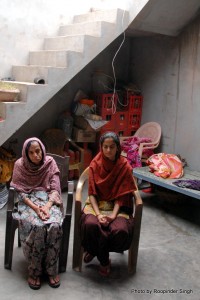
Mother and sister of Rupinder Singh and Jaswinder Singh, two brothers of Panjgrain Khurd village who were arrested by police for alleged blasphemous act. They were released under pressure from villagers and others.
Many others in the village attest to the devotion of the family, which has seen rather tough times. They have been living there for more than 50 years, and had only recently been able to build a house, which is far from complete, with cloth curtains hanging where doors ought to be.
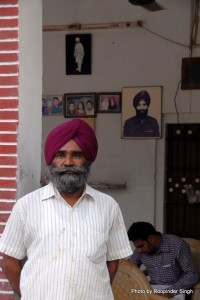 Parminder’s sisters are married into devout families, and she is studying for her Master’s degree in Punjabi. Rupinder was known to be active in various religious endeavours, as well as turban-tying competitions. The practically unanimous support from the village and many loopholes in the police “evidence” against Rupinder helped create an atmosphere where they were eventually released on November 2, with the police saying that they did not have sufficient evidence against them to keep them in jail or custody.
Parminder’s sisters are married into devout families, and she is studying for her Master’s degree in Punjabi. Rupinder was known to be active in various religious endeavours, as well as turban-tying competitions. The practically unanimous support from the village and many loopholes in the police “evidence” against Rupinder helped create an atmosphere where they were eventually released on November 2, with the police saying that they did not have sufficient evidence against them to keep them in jail or custody.
By this time, the police version had been discredited, the Director General of Police replaced and political leaders made a beeline for this hitherto sleepy and unknown corner of Punjab.
The gurdwara at Burj Jawahar Singh Wala now has CCTV cameras, as do many others, and people’s endeavour to not allow the situation to take a communal turn is being tested as more incidents of sacrilege come to light and the authorities are no nearer catching those responsible.
This article was published on November 8, 2015 on the Perspective page of The Tribune
Getting a sense of it all
BATHINDA has grown into a rich town with infrastructure that could be the envy of many places in Punjab. The pocket borough of the first family of Punjab politics stands far ahead of other towns of the state in many regards, yet there is a palpable sense of rage against the ruling dispensation.
The failure of the cotton crop badly singed the farmers and they blame the government for the questionable insecticide that was supplied to them. As one activist put it: “The first target of the anger is the local representative of the Shiromani Akali Dal or the SGPC, but soon it goes up to the most visible targets, the Chief Minister and the Deputy Chief Minister.” Remedial measures undertaken by the government are perceived as a case of too little, too late. SGPC members have largely been marginalised. Incidents of desecration have hurt religious sentiments. However, people are wary, the timing is suspicious and there is a sense that some “agencies” are behind them..The attempt to pin the blame on Dera followers was unsuccessful, and people have managed to keep their cool in spite of a number of provocative incidents in various villages. For this, the credit goes to the ordinary man on the street, who is wise enough to avoid falling into any trap that would communalise the situation. Coupled with this is active and visible support from non-Sikh communities, especially in urban areas. A perception of initial apathy by the police, and highhandedness in dealing with the protests that sprang later, fed public anger. After two suspects were arrested from Panjgrain Khurd, the village was unanimous in asserting their innocence in any blasphemous activity. The police eventually released the suspects, and lost credibility in the process. More arrests have been made, and some people have allegedly confessed to their role in other desecration incidents, but the police have yet to provide a credible answer to the question of who has done all this and why. However, the recent change in the police leadership, and subsequently in the manner of its operation, has already yielded some positive results.
Political parties are now active in the region, and this is making new headlines. It would be utterly irresponsible of politicians to exploit a situation like this.SAD leaders speak of the situation taking a political turn. This is true, but nothing new. The public anger is against the political establishment, now other parties too have jumped into the fray. The cauldron is simmering at the moment; every sane person would want it to cool down, not to boil over.
What they say
Ideology is the root of the problem. Our politics has become personality- oriented and we see the same economic agenda that is advocated by people who are supposed to be poles apart. We have a feudalistic structure that is not democracy-friendly, and since we go from one election to another, we have short-sighted economic planning and do not plan for the future.
Prof Paramjit Singh Romana, Author-Academician
People take to the streets because they have no way to express themselves. Thinkers played a great role in European revolutions, but our intellectuals like to stay away from politics. However, politics has a fundamental impact on our lives. The issue of farmers’ suicide is causing anger. The bedrock of rural economy is farming and if a farmer dies, it impacts not only his family, but others too.
Neetu Arora, Poet-Author-Academician
The SGPC has not been able to provide proper leadership after it backtracked on the Nanakshahi Calendar. The youth is angry on various issues and is taking to the streets.
Balwant Singh Nandgarh, Former Jathedar, Takht Sri Damdama Sahib

